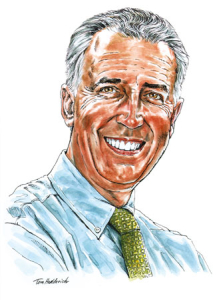Norman Horowitz Syndrome: A social and business condition that is beneficial to all concerned, but its value is not yet fully appreciated.

When TV executives retire, they have two options: quietly disappearing from the industry or continuing to stay active by attending conferences and TV trade shows. They can either become insignificant or stay relevant. I call this latter option the “Norman Horowitz Syndrome.”
Upon retirement, many entertainment executives who held top positions find it debasing to stay on the scene without the prestige of a company behind them, so in a sort of shame, they distance themselves from active participation in any role.
Talking with these former executives, the example they inevitably bring up is that of the late Norman Horowitz, a former top executive at CBS, Columbia and MGM, among others.
In retirement, when his health allowed, Norman insisted on staying relevant. How? By attending TV trade shows, by writing for various publications, by staying in contact with industry people in person and via e-mail, and attending trade organization meetings.
To some executives who held top spots, seeing Norman often walking alone along the Croisette in Cannes left a bad impression. Later, upon retiring themselves, they told me that when they were active and Norman was seen from afar, they would cross to the other side of the street in order not to bump into him, then each concluded: “I don’t want to be thought by others that way!”
So, these retirees with their still vibrant energy, their intellect still sharp, with their vast knowledge, their many contacts and … time on their side, in order to avoid the “Norman Horowitz Syndrome,” they play tennis or golf in desolate fields, away from what they liked to talk about the most: working in the entertainment business.
Usually, top-level TV executives don’t retire on their own account, unless incapacitated. After all, the entertainment business is not like working for the post office, where retirement is mandatory at a certain age. To think of it, people seek employment with the post office with retirement in mind from the start.
In our business, retirement is often a consequence of management changes, when upper echelons want to bring in their own trusted people and contract clauses allow executives to bail out if they’re climbed over.
There are also cases of new owners, who think that they have innovative approaches and bring in new, often inexperienced people who “think outside the box.” In these situations, like in the case of Edgar Bronfman Jr. buying MCA from Matsushita in 1995, the experiment lasted only five years before selling what was renamed Universal to Vivendi.
Naturally, “active” retirees have to be conscious of the fact that executives attending markets (both buyers and sellers) are very busy and need to focus on the business at hand, like they did during their tenure. Indeed, the fear of those who cross the street in order not to bump into retirees is that they will take up some of their valuable time.
Here, however, the interplay gets complicated: on one hand, the residing executives feel guilty for not having the time to give the old guard (who often were their mentors) their deserved respect. On the other hand, if the retirees feel ignored, they become resentful, especially toward the people they hired or promoted.
A win-win situation for this quagmire is for trade show organizers to utilize old-timers’ knowledge and experience to liven up conferences, which lately tend to be of the “everything is fine, we are great, thank you” types.
This solution could also be an incentive for young executives entering the entertainment business to attend conferences in order to learn test cases that, inevitably, if in other forms, tend to re-appear. Because after all, there is no need to re-invent the wheel.
by Dom Serafini
Audio Version (a DV Works service)

Thank you, Dom, well said. I’ve unfortunately been with those execs walking down the Croisette when they suddenly had to call someone or ‘forgot a meeting’ they had to get to. I’d continue up to Norman and give him a hug. Of course, not all of them would run in the other direction, perhaps those that did were simply insecure. Norman never defined himself by his position, only by his integrity as a man. Honest to a fault, Absolutely! And we loved him for it!